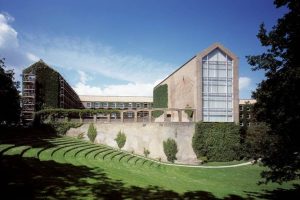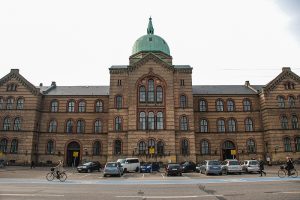
Technical University
The Technical University of Denmark is a public university in Kongens Lyngby, just north of Copenhagen. It was founded in 1829 and is one of Europe’s oldest and most prestigious technical universities. The Technical University of Denmark has a long and distinguished history, tracing its roots back to 1829 when it was founded as the Royal Danish Academy of Engineering. Over the centuries, it has evolved into one of the leading technical universities in Europe, The university has a strong global reputation and is consistently ranked among the top universities in the world for engineering, technology, and natural sciences. In 2023, it was ranked 45th in the QS World University Rankings by Subject for Engineering and Technology.
The Technical University of Denmark is renowned for its cutting-edge research and innovation. It has significantly contributed to fields like renewable energy, nanotechnology, biotechnology, and computer science.

Research
Research is a major focus at the Technical University of Denmark, with the university conducting groundbreaking work in areas like sustainability, renewable energy, digital technologies, and life sciences. The university has strong ties to industry and government, collaborating extensively on research and innovation projects. Many of DTU’s research findings are applied to real-world problems and commercialized.
Research facilities
DTU houses some state-of-the-art research facilities and labs, including the Risø National Laboratory for Sustainable Energy and the National Space Institute. The university also operates several science parks and innovation incubators to support entrepreneurship and the commercialization of research, The university houses several state-of-the-art research facilities and labs, including the Risø National Laboratory for Sustainable Energy and the National Space Institute.
The university also operates several science parks and innovation incubators to support entrepreneurship and the commercialization of research.
Interdisciplinary Collaboration
DTU strongly encourages interdisciplinary collaboration across its 18 academic departments and numerous specialized research centers.
Many of the university’s most groundbreaking projects and innovations involve teams of researchers from diverse backgrounds working together to tackle complex, real-world challenges.
For example, DTU has established several interdisciplinary “lighthouse” research initiatives that bring together experts in fields like sustainability, digital technologies, and life sciences.
This collaborative approach stimulates new ideas, facilitates knowledge sharing, and leads to more impactful and innovative outcomes.
Campus and Student Life
The main Technical University of Denmark campus is in Kongens Lyngby, just north of Copenhagen. The campus features modern, purpose-built facilities and amenities for students, There is a vibrant student community at the university, with over 100 student organizations, sports clubs, and social events. The university places a strong emphasis on extracurricular activities and community engagement.
The university has a diverse international student body, with students from over 80 countries represented on campus. The university offers support services and resources for international students.
Technical University of Denmark has a diverse international student body, with students from over 80 countries represented on campus. The university offers support services and resources for international students.
The university offers a wide variety of continuing education and professional development courses. These include part-time and online programs, executive education offerings, and customized training solutions for industry partners.
The goal is to enable working professionals to upskill, reskill, and stay current with the latest advancements in technology and engineering,
These include part-time and online programs, executive education offerings, and customized training solutions for industry partners.
The goal is to enable working professionals to upskill, reskill, and stay current with the latest advancements in technology and engineering. Many of these continuing education offerings are developed in close consultation with employers to ensure relevance and impact on participants’ careers.
DTU sees lifelong learning as crucial for individuals and organizations to adapt to the rapidly changing technological landscape.
.
Admission Requirements
The admission requirements for the Technical University of Denmark (DTU) vary depending on the specific program and degree level. However, here are the general admission requirements:
Bachelor’s Programs
- Completion of upper secondary education (e.g. high school diploma) or equivalent
- Strong background in mathematics, physics, and/or chemistry
- Competitive grades and academic performance
- Proficiency in English (e.g. TOEFL or IELTS scores)
Master’s Programs
- Bachelor’s degree or equivalent in a relevant field of engineering, science, or technology
- Strong academic record and GPA
- Relevant work experience may be considered an advantage
- Proficiency in English (e.g. TOEFL or IELTS scores)
PhD Programs
- Master’s degree or equivalent in a relevant field
- Excellent academic performance and research potential
- Alignment of research interests with DTU’s research priorities
- Proficiency in English (e.g. TOEFL or IELTS scores)
- Funding source (e.g. scholarship, research grant, or self-funded)
In addition to the academic requirements, DTU may also consider other factors such as:
- Extracurricular activities and leadership experience
- Motivation and fit with the university’s values and mission
- Diversity and cultural background
The admission process typically involves submitting an online application and providing transcripts, test scores, and other supporting documents. Applicants may also be required to participate in interviews or provide additional materials depending on the program.


